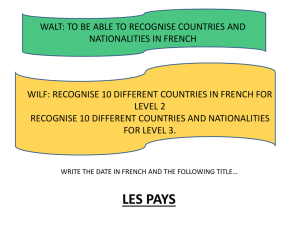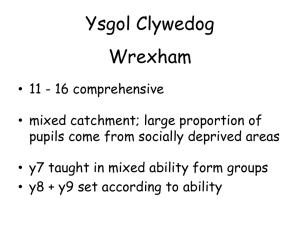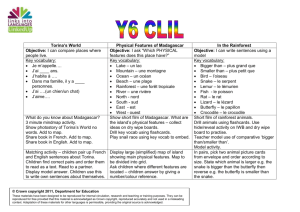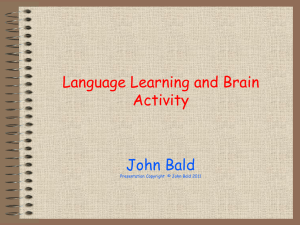1 & 2
advertisement
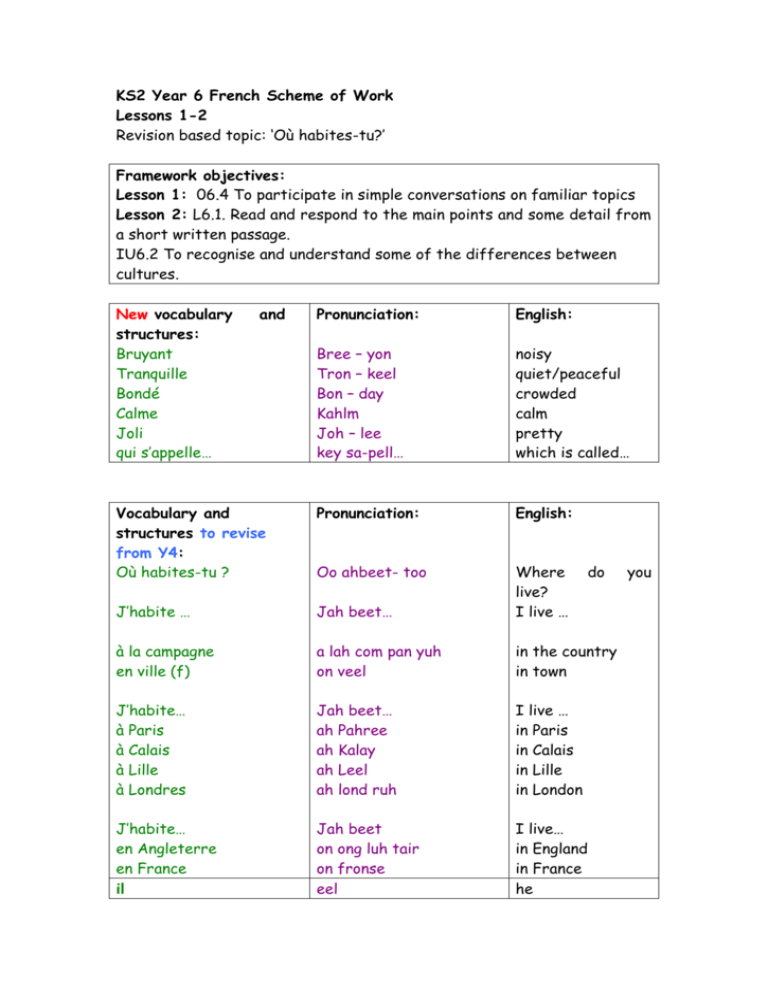
KS2 Year 6 French Scheme of Work Lessons 1-2 Revision based topic: ‘Où habites-tu?’ Framework objectives: Lesson 1: 06.4 To participate in simple conversations on familiar topics Lesson 2: L6.1. Read and respond to the main points and some detail from a short written passage. IU6.2 To recognise and understand some of the differences between cultures. New vocabulary structures: Bruyant Tranquille Bondé Calme Joli qui s’appelle… and Pronunciation: English: Bree – yon Tron – keel Bon – day Kahlm Joh – lee key sa-pell… noisy quiet/peaceful crowded calm pretty which is called… Vocabulary and structures to revise from Y4: Où habites-tu ? Pronunciation: English: Oo ahbeet- too J’habite … Jah beet… Where live? I live … à la campagne en ville (f) a lah com pan yuh on veel in the country in town J’habite… à Paris à Calais à Lille à Londres Jah beet… ah Pahree ah Kalay ah Leel ah lond ruh I live … in Paris in Calais in Lille in London J’habite… en Angleterre en France il Jah beet on ong luh tair on fronse eel I live… in England in France he do you elle et toi ? el eh twa? she and you? Extra Resources: Early Start French ‘Où habites-tu?’ DVD. Resources relating to above topics from Camden Y4 SoW Powerpoint Flashcards Worksheet Mini whiteboards Suggested Teaching Sequence: Lesson One- Oracy focus Most of the Year 6 lessons revise vocabulary from the Camden Y4 SoW and then extend these topics with new grammar and further vocabulary. There are words, picture cues, audio support and video clips of the relevant mimes for the revision based vocabulary (Y4) on the Camden website. Please reference these if either you or your class are unsure of pronunciation. Every Year 6 lesson is supported by a Powerpoint/Smart Notebook which will support all activities referenced in the lesson plans. Share the learning intention shown on slide 1 with the class. Warm up by asking questions learnt in Years 3 and 4 (Early Start 1 and 2) e.g. Comment t’appelles- tu?, and recap on the question Où habites-tu?. Show slide 2 and see what they can remember from learning in previous years. Using Powerpoint slide 3 to recap on vocab used from Y4 SoW to describe where the children might live e.g.: à Londres, en Angleterre, à la compagne, en ville. Point to each picture and model the sentence e.g. J’habite en ville. Children echo phrase. Repeat with all four phrases. Assess understanding and whether they are ready to move on to the ‘New Learning’. Use slides 5-7 to recap c’est and teach the new vocabulary (adjectives to describe places). The class choose a mime to represent each of the adjectives. Children volunteer to ask the teacher ‘Où habites-tu?’. The teacher answers by drawing a simple symbol to represent countryside (a tree) or town (a towerblock) and also doing an action to show an adjective which could be used to describe it. Can the children say this in French? E.g. J’habite en ville. C’est bruyant Try the activity in pairs. Check understanding by doing a mini-plenary. Using slide 8, introduce a more complex sentence structure and note the use of colour coding for support (verbs are purple, proper nouns are yellow, nouns are blue (masculine)/red (feminine) and adjectives are orange) Explore the use of connectives and the addition of new vocabulary qui s’appelle to the sentence. Can they use this to give more information e.g. ‘J’habite en Angleterre. J’habite dans une ville qui s’appelle Londres. J’habite à Camden/Kilburn’ etc. Explain that in this sentence the dans does not have a silent ‘s’ as it is followed by the vowel at the beginning of une. Dans une ville’ is used instead of en ville because it means in a town/city rather than in the town/city. Recap on the meaning of connectives qui and et and the verb s’appelle. Display all the flashcards for the new and revised vocabulary and model how to use these visual cues to ask and answer the question e.g.: ‘Où habites-tu?’…. ‘J’habite dans une ville qui s’appelle Londres et c’est bruyant’. The children work in pairs asking and answering the question giving a variety of answers using the flashcards as a prompt. Do a mini plenary to check understanding before moving on. Brainstorm how many places in France the children remember. You might want to show them the first part of the EarlyStart DVD or the Powerpoint from the Y4 SoW to remind them. Make a list on the board. Use Powerpoint slide 9 to recap on il / elle. How would you say where he/she lives? Can do this and add an adjective to extend the sentence? E.g. ‘Il habite dans une ville qui s’appelle Calais et c’est joli’. Extend the more able by asking them to use more than one adjective to describe the place. E.g. ‘Elle habite dans une ville qui s’appelle Lille et c’est bondé et joli’. Plenary: Play ‘Name chain’. Children sit in groups of about 6. Pupil 1 says ‘J’habite dans une ville qui s’appelle .... et c’est …’ naming where they live and describing it, and asks the next child ‘Et toi, où habites-tu?’ Pupil 2 answers then asks Pupil 3 and so on until each child has spoken. If you feel they have understood this then as an extension they can try to remember where the person next to them lives and introduce their neighbour E.g. ‘Il/Elle habite dans une ville qui s’appelle … et c’est ….’. Lesson Two – Literacy Focus Ask the children the question ‘Où habites-tu?’. Revise phrases from the previous session encouraging them to give as much information as they can e.g. ‘J’habite en Angleterre. J’habite dans une ville qui s’appelle Londres et c ‘est bruyant et bondé’. Use mimes and flashcards for visual support where necessary. Recap on il / elle to describe where someone else lives. Introduce the country that Yr 6 will be studying for Intercultural Understanding this year - Vietnam. Explain that Vietnam is being studied as it has a strong historical connection with France. Although Vietnamese and its sister languages are now the official languages spoken there, French used to be an official language. (N.B. for teacher information, there is an explanation of the historical significance of French in Vietnam attached to this Scheme of Work) Show the first page of the Powerpoint. Which continent is Vietnam in? Ask what any of the children know about Vietnam already. Have they been there, do they know any Vietnamese people or can name any towns or cities? Give each child a card with one of the five main cities in Vietnam written on it (use the sheet of name cards provided). The class walk around the room asking ‘Où habites-tu?’ until they find a partner from the same place. Then they have to move on to find other partners with the same place name. Use the next whiteboard slide to locate them on a map. Explain that Hanoi is the capital of Vietnam (and that they do not use the French phonic sound for ‘oi’ to pronounce it). Look at the Powerpoint slide featuring pictures of places in Vietnam. Display the flashcards with the adjectives describing places. Is the adjective used to describe each place correct? The children answer oui or non. Can they use the correct adjectives to describe the places? (e.g. ‘à Can Tho c’est …’). Remind them to use à and not en as it is a city, not a country. Complete the Lesson 2 worksheet. The children have a look at the pictures, read the French and circle oui or non. Then they read the sentences and fill in the missing words. Finally they try writing sentences of their own, differentiating the complexity of sentence depending on ability. Have the visual cues provided on display to support the less confident with this. Plenary: Using a mini whiteboard with a partner they draw a male or female character and write as much information as they can about where the character lives. They can choose whether their character comes from England, France or Vietnam. They then swap boards with another pair. Can the other children translate what they have written? Notes on activities and resources: You could use the song ‘Où habites-tu?’ from EarlyStart to recap on French place names. Follow-up and consolidation Recap on the vocabulary by asking ‘Où habites-tu?’ during the register. Put up a map of Vietnam with towns and cities marked to consolidate. Discuss what it might be like to live in Vietnam. Many of the adjectives learnt in this topic can be used incidentally throughout the week e.g. noisy, quiet, when commenting on behaviour and calm or busy to describe places in school.
